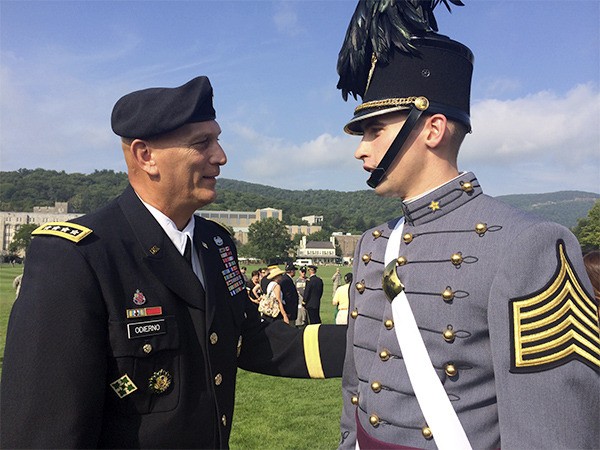Will Goodwin graduated from Mercer Island High School in 2011, and surprised his family and friends by deciding to attend the United States Military Academy at West Point the next year. He said that he wanted to pursue the leadership opportunities in the Army. He became the president of his class and will soon lead a group of 44 officers. Last week, he came back to the Island to speak to high school students, Rotarians and others about his experiences and accomplishments.
MIR: Did you always know in high school that West Point was where you wanted to go?
Will Goodwin: No, it didn’t really come about until sophomore or junior year. I enjoyed a lot of my classes, but when I looked at what I really enjoyed, it was the leadership program at the high school and working with other people. To be able to graduate from West Point, be 22 and have 44 people you’re directly in charge of, in a pretty stressful line of work, was what drew me in.
MIR: What does your role as class president entail?
WG: It’s interesting because you have a military structure there that’s very hierarchical, and there’s also a parallel class leadership system. We plan events that are specific to the class. After graduation it’s a pretty important role as well. We’ll handle reunions and we also have a good support group, because odds are someone will get killed at some point in a conflict. So providing support for families and funeral arrangements is a big aspect of what it is after graduation.
MIR: Do you know what you’re going to do after graduation?
WG: I’m going to be a field artillery officer. (The officers) will receive a request for support, they’ll do the math on how they have to aim (the guns) and they’ll look at the platoon leader, which is what I would be, for the ultimate thumbs up or thumbs down. The stress there comes in the fact that whatever you hit is your responsibility, so if you don’t do the due diligence and you hit a school or a hospital, you go to jail.
MIR: When did you find out that that’s what you will be doing?
WG: I found out on Thursday (Nov. 20). (West Point) keeps class ranks with academics, physical program scores and a military evaluation, and based on how well you do, you get to pick what your job is.
MIR: What is the most important thing you’ve learned at West Point?
WG: I kind of boiled it down at the high school yesterday to a three-liner of what my leadership takeaway has been. I borrowed the first part, but it’s: lead the way you want to be led, follow the way you want to be followed and invest in people. You come out of a place like Mercer Island and you think you’re on top of the world. The good thing about West Point is that they beat you down, literally. I had to take a boxing class in my first semester.
MIR: Did you do ROTC in high school? How was the transition to West Point?
WG: It was a weird transition. Other people have done junior ROTC or come from the military, but they do a good job of starting everyone on a level playing field. I didn’t feel disadvantaged, but it was a total culture shock from MIHS. I think the underlying things I learned here (on the Island) carried me through. The sense of community here is awesome. You see it in Rotary and the leadership at the high school. That’s something that not everyone experiences.
MIR: Do you have any anxieties about life post-graduation?
WG: It’s kind of nice to know what you’re going to do (after graduation in May). The deal with getting to go to West Point for free is that you owe five to eight years. There’s a certain anxiety that comes with it just because you’re starting to split apart from the people you’ve spent four years with, and then you add in the uncertainty of, what am I going to do in those five years? I watch the news. Stuff is happening everywhere – Ukraine, East Asia. Wherever the nation decides they need the military is where we have to go. It’s what I signed up for, but it’s also a lot of uncertainty.
MIR: What do you do for fun at West Point? What types of events do you plan?
WG: We do a lot of formal banquets. I’ve been on the crew team. I met Brian Williams when we went to this dinner over the summer with a small group of cadets. I’ve met Rachel Maddow twice. You get to hear firsthand from some of these people, like the chairman of the joint chiefs. I’ve seen the president speak, I’ve seen the vice president speak. Those opportunities are awesome. It’s kind of a weird dynamic because you won’t be in those situations again for 40 years until you become a general or something.
MIR: Is that the goal?
WG: I don’t know. Some people love it and they stay forever, and some people don’t. So I just try to take each day one at a time and make the most out of the five years that I owe, and if I’m still having fun at the end, I’ll keep going.


